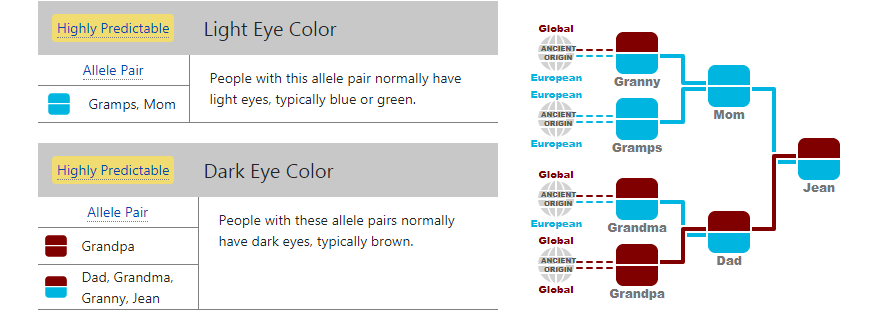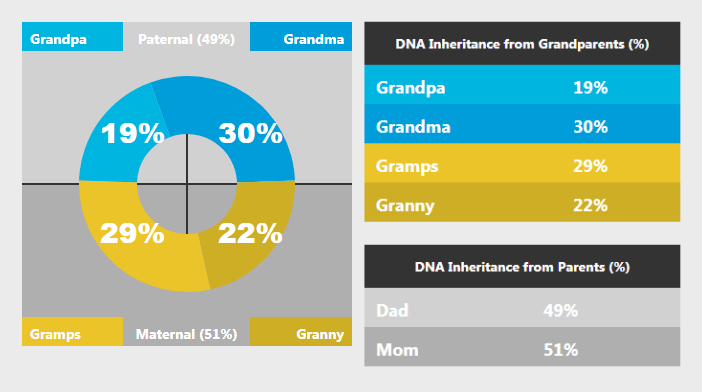
Can genes determine your destiny? When it comes to genetics, we are surrounded by ignorance, fake news, myths, and disinformation. It’s time you knew the truth! In this interview, Gene Heritage Founder and managing director Castedo Ellerman discusses some misconceptions about genetics and explains why you should never expect deterministic answers from DNA analysis.
Let’s start with a bit of background about who you are and what you do?
My background definitely is not formally in genetics. I worked in software for a long time, and then I worked on wall street for a long time. The common theme has been mathematics and my interest in genetics started from the mathematical angle of using mathematics to analyze DNA data. And it started in 2015 when I was analyzing the DNA data of family members. Almost everyone in my family ended up getting raw DNA data. From my parents to my generation, my children, my brother, and his entire family. I had a lot of family members that were all getting DNA data. It was a fun mathematical challenge to actually make conclusions. Initially, it was mainly about how much DNA has everyone in my family inherited from the grandparents. Along with that, I was curious to find various genes that are very common like the genes for lactose intolerance and blue eyes. After doing that for family members, I ended up open-sourcing the code that I used. A year later, I started Gene Heritage as a business with a friend who runs a motion graphics design firm. And that’s really how I got into it.
What makes your service unique?
I think what makes Gene Heritage reports a little bit different is the mix of how some genes have a really strong, direct effect on some observable traits and things that most people can understand, and some genes have a very small effect.
Interestingly, I found that some Gene Heritage customers, and certainly family members that have used the reports, are recognizing that sometimes what people hear about genes is actually very far from reality. The classic example is the athletic gene, as it sometimes gets presented, and five years ago that was making a lot of headlines. That actually has a very small effect compared to something like the gene that affects eye color, which has a much stronger effect. It may not be 100% deterministic but it’s a very strong effect that is observable. It’s partly why it’s known because it has such a predictable external effect.
I spent a lot of time trying to think what’s the best way to communicate this variation in genes as far as what kind of effect they have. I found it a struggle when initially designing reports that people tend to expect a deterministic result. They start from this basic intuition that if the gene has something to do with x y z, then it must mean a b c. They’d say, “Oh, I have a gene that makes me taste something, I must be a super-taster”. It’s perfectly deterministic.
What I ended up doing and what’s in Gene Heritage reports now is a three-level score of how predictable the trait is, based on the DNA data that someone has. Each gene gets rated as either highly, fairly, or barely predictable. The athletic gene is rated barely predictable, versus the gene that affects eye-color, which is highly predictable.
Below are some example parameters from Gene Heritage reports


How do you utilize the data that you collect?
Actually, I don’t. It’s really research papers that are the basis of the reports. I don’t include anything similar to what 23AndMe does, where they actually report statistics based on how many customers have such and such traits. I really try to make it based just on the research papers that I’ve read and digested and what they are saying about whatever is the raw DNA data that a customer is uploading.
Who is your typical client?
Actually, it was a little bit of a surprise. There are a couple of different kinds of customers that will use Gene Heritage. The initial DNA analysis and grandparents’ reports, which were the inspiration for Gene Heritage, are mainly mathematical. They report on what percentage of DNA from various grandparents actually was inherited by various children.
I always found that a fun statistic because I have two daughters. One of my daughters has more or less what you would expect, which is about a quarter from each grandparent; but then my other daughter has significantly more genes from her maternal grandfather and significantly more from her paternal grandmother. It was surprising to see how big of an effect varying amounts of DNA from different grandparents can be seen in grandchildren.
A large portion of Gene Heritage customers is clearly interested in the grandparent reports because they’ve uploaded three generations of DNA. But most people just get a single individual report. They just have a curiosity about what they can find out.
There definitely are people who are assuming that what you’re getting is ancestry information, similar to ancestry.com or 23andme. That often is a surprise for Gene Heritage customers, because really the only thing that Gene Heritage reports that has anything closely related to ancestry is some genes such as the common blue eye-color gene. Some of these genes clearly have a continental ancient origin. All evidence suggests that these are mutations that originated at a specific continent many thousands of years ago, probably more than 10,000 years ago.
So, when people have that evidence in generic reports they are listed as having an ancient origin, but that’s usually different than what some people are looking for. I assume it’s because when people first started getting DNA tests, that’s all they were interested in and that’s what they were familiar with.
In other cases, for the most part, Gene Heritage customers are just curious. Gene Heritage in some ways is more of an educational tool, so it’s not really a tool for living a healthier life or finding out your best diet. I would say it’s more about being informed and learning about the scientific details of some of the genes.
I certainly have found it very interesting to learn about all the different taste receptor genes. So, there is a little bit of overlap with diets and food that a lot of people are interested in. Almost half of the genes on Gene Heritage actually relate to taste receptors. One of the reasons for reporting that is there’s a relatively simple relationship between genes and taste receptors on our tongue. Most relationships between genes and traits are very indirect relationships that don’t have the degree of simple effect that people can understand. But in the case of taste receptors, compared to everything else, it’s fairly direct.
Some of the DNA results that people get elsewhere might be saying you’re a super-taster, which is a very simplistic summarization of something much more complicated. It might be a little bit more detailed, for instance, saying that you are more able to taste bitter tastes. Gene Heritage reports go into much more detail. From a genetic standpoint, someone might have receptors that are more sensitive to bitter tastes, but not to sweeter tastes. The relationship between whether you like something and whether your taste receptors are sensitive is also different.
Some of the people using Gene Heritage reports are getting much more scientific details on what these summary-level titles like sweet-taster or bitter-taste actually mean. There are lots of different bitter taste receptors and Gene Heritage will actually report on the various types of and whether or not you actually have a gene for which there’s evidence that you would be more sensitive to particular kinds of substances.
What are your future plans for Gene Heritage?
Gene Heritage reports have been on a pause for 2019, so the current versions that are on the service now are the reports that were developed at the end of 2018. For the past year, I actually have been studying with the help of a professor and a postdoc, so I’ve been picking out material, going through textbooks and research papers, and getting guidance from these individuals that are in genetics here locally in Boston.
One of the things I’ve come to appreciate is that in order to have a more accurate indication of how much a particular DNA data relates to a trait of interest, you really need to know what global population the DNA is being drawn from. So using ethnicity-based estimations of what traits people have is something that I’m excited to be learning more about and incorporate later in Gene Heritage reports.
Which industry trends do you expect to see more of in the coming years?
Well, there’s one development that is probably oversimplifying things but it does seem like there’s been a splitting of different kinds of services. So initially there was just direct-to-consumer, which is a category of itself. It does seem that the medical industry has been developing reports that have a more clinical, science-based context, relating to what’s actually supported by evidence and that seems to be advancing in a more clinical context. Certainly, 23andme is kind of a hybrid, it’s a little hard to tell how they will relate to that.
Obviously there are genealogical related services, predominantly ancestry.com, which has been around for a long time and will obviously continue to be attracting prospects as DNA science continues to evolve. It does seem that there’s a bit of a split, where what might have initially been only 23andMe, there are now these two extremes of reports in a clinical context that are based on hard science, and then the spectrum of other services that, as time goes on, some of them will become more and more like horoscopes. There’s this kind of trend of genetic horoscopes where people are making all kinds of claims and, similar to horoscopes, as long as your claims are somewhat vague and ambiguous, anyone can believe it. It might have very little to do with your DNA, just like what month you were born in has very little to do with a lot of what horoscopes predict.
How can one tell the difference between science-based data and “genetic horoscopes”?
One way to tell the difference is whether there’s an indication of uncertainty or effect size being reported. This is one of the things that’s very difficult for most readers to recognize. Certainly in scientific papers, you always have certain numbers like the odds ratio or the heritability, or how much variance is explained. Any scientific paper will always have numbers indicating how big is the effect size or how much uncertainty is there about the evidence.
Unfortunately, most people don’t know what these terms and numbers actually mean. Variance is a weird number for most people that maybe they vaguely remember from school. So a lot of these numbers that go into research papers don’t make it into consumer services.
With Gene Heritage reports, I tried to simplify things by putting them into one of three categories: barely, fairly, and highly predictable. If you have your DNA data but you’re not sure what the effect is, how well does this really predict something that you’re interested in. And just trying to stick to those three adjectives.
One way to differentiate a genetic horoscope from the serious stuff is checking whether the report includes any indication at all as to whether there’s a deterministic effect or not. If the report is vague and there’s no indication, that should bring the assumption into question. Without any further evidence, the effect could be extremely small.
Generally, I think one has to use judgment, like with any consumer service. There’s a whole industry of exercise equipment that’s questionable; there’s a whole industry of various kinds of substances that people can buy to improve nutrition. As with any unregulated industry, it’s important to keep a critical mind by asking “is this really based on hard science, or is someone just trying to sell me something?”
I think this is one of the most difficult things with DNA. Gene Heritage reports can help people appreciate it by going into the details and seeing when there’s a disconnect between what we understand in everyday life and actual, concrete genes, and really see how it can be disconnected. We all have these intuitions about genetics and DNA.
During the 20th century, we’ve seen a lot of major discoveries where we realized that in some cases, there are very direct relationships between DNA and some diseases or traits. That, combined with the general notion that there’s something essential in us that determines our fate and who we are, has led people to believe that anything labeled DNA is one of these essential things.
People need to keep in mind that’s not always true. In fact, as time goes on and more and more is discovered, that becomes less and less true. There are very subtle relationships, and probably if it relates to something very everyday-ish or something where someone is selling something because it’s going to help them lose weight or be happier, whatever kind of claim it is, one should remind themselves that DNA is not destiny and the relationship is not as direct as our intuitions might be telling us.
I started in 2014, knowing almost nothing about genetics, and now, having learned quite a bit, it was really surprising to realize how far my intuitive assumptions were from the actual facts. If you go into the details, you’ll soon realize it’s much more complicated than that. Some people describe DNA as an ingredient list rather than a recipe or a blueprint. A lot of people have this intuition that our DNA is this blueprint that’s determining who we are, but really it’s more like an ingredient list where you have the information but you don’t have the context, so you need a lot more information to really be certain about the results.
So how easy is it for people to understand the reports that you produce?
It varies, and it’s tough because it’s really about the wording we choose. There’s a lot of terminologies that I ended up taking out of the reports in order to simplify them. For instance, I don’t include odds ratios and statistics on heritability. I try to simplify that just into the “highly”, “fairly”, and “barely” predictable ratings.
One thing that’s very confusing about genetics is that we often think of a gene, in a singular sense, as if there’s a single gene that determines a trait. In reality, we’re all carrying two copies of all these genes, called alleles, one from our mother and one from our father (with various exceptions like mitochondria and the Y chromosome).
Gene Heritage reports give a graphical representation of that. We spent a lot of time trying out different ways of presenting pairs of alleles in colorful ways, but that can be challenging. Even using the word allele is a little too much for some people. But every report has a different audience. When scientists are doing academic papers, they have a certain audience in mind. In the case of Gene Heritage, there’s a certain vocabulary that we decided to use, and include a definition that describes it.
Essentially, if someone’s going to understand the Gene Heritage report, they either need to know what a gene allele is or have the curiosity to look at the key and read the definition.
Occasionally, there are people that aren’t happy with the reports, saying they didn’t find anything useful or practical. I don’t think they were interested in learning what gene alleles are or understanding how the genes relate. They just wanted a quick, deterministic answer about what’s going to happen to them. So there’s horoscope and then there’s just what you’d expect from a clinical environment: what diseases do I have? Am I going to have breast cancer?
Even though they’re very different in terms of how scientific they are, both horoscopes and clinical practices have this pragmatic notion of getting a report that’s going to help you do something more useful. That is not what Gene Heritage is about, although there are a few exceptions.
It’s mildly useful to know whether you have the gene for lactose intolerance, as it can give you some indication about what to look out for. But for the most part, Gene Heritage is more of an educational product. It doesn’t give you practical tips, but a better understanding of the associations between genes and traits.
Perhaps someone told you you don’t have the athletic gene and you’re thinking, maybe I shouldn’t do sports. But you could read a Gene Heritage report and hopefully appreciate that’s really not a reason to stop doing sports and the effect is extremely small. By understanding the science, one can better understand the limitations of a lot of these reports, which in itself is practical.

